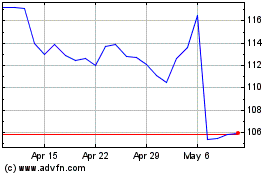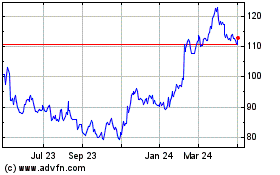By Erich Schwartzel
This article is being republished as part of our daily
reproduction of WSJ.com articles that also appeared in the U.S.
print edition of The Wall Street Journal (August 19, 2019).
LOS ANGELES -- About three months after Walt Disney Co. acquired
Twentieth Century Fox, the two studios hosted a red-carpet premiere
in Hollywood for the X-Men movie "Dark Phoenix," the first major
Fox offering since the merger.
Before the event this summer, Disney sent Fox executives and
staffers a 13-page memo outlining exactly how the event should go.
Men were to shave, and women were to "wear light makeup." Workers
were encouraged to wear a wristwatch since using a phone, either to
check the time or to take pictures, was a strict no-no. And Fox
employees were to make sure the movie's stars weren't chewing gum
on the red carpet, according to the memo, which was seen by The
Wall Street Journal.
It was one of the few detailed communications Fox workers had
received in the roughly year-and-a-half since Disney agreed to buy
the entertainment assets of 21st Century Fox for $71.3 billion,
including Twentieth Century Fox. So when Disney Chief Executive
Robert Iger told Wall Street analysts this month that Fox films had
dragged down a record year for his studio, some Fox executives
pointed the finger back at Disney.
Mr. Iger said the Fox studio's performance "was well below where
it had been, and well below where we hoped it would be when we made
the acquisition." He put most of the blame on a protracted
acquisition process, with 17 months passing from when the deal was
announced in late 2017 to its closing in March. Fox executives,
however, privately say it had more to do with uncertainty and
indecisiveness stemming from Disney's lack of communication during
that time.
The clashing views highlight an issue common in large
acquisitions, particularly ones that drag on due to regulatory
scrutiny or other complications. Such delays and uncertainty often
lead to a talent exodus, employee anxiety and corporate paralysis
at the company being acquired.
In this case, Disney was preparing to absorb not only a movie
studio, but also a major television-production operation, overseas
subscription-TV providers and a controlling stake in Hulu, the
streaming service. Disney is leaning on the Fox film and television
library to bolster the separate streaming service it is creating to
compete against Netflix Inc.
After the deal closed, the challenge of integrating Fox was
compounded by the poor performance of its movie lineup. The
collective box-office gross of Fox's six 2019 releases -- about
$240 million -- is still around $100 million less than Disney's
"Avengers: Endgame" made in its opening weekend.
"Dark Phoenix" flopped terribly, forcing Disney to take an
impairment charge. It was the biggest bomb on a Fox slate that also
included the misfires "Stuber," "The Kid Who Would Be King" and
last week's "The Art of Racing in the Rain," all of which came and
went with dismal showings.
Layoffs and attrition since the deal's announcement left Fox's
marketing and publicity departments depleted, resulting in
advertising campaigns that some employees describe as creatively
uninspired, paint-by-numbers operations. As Fox continues to
release movies left on its calendar, there are still some employees
remaining in those divisions, but many offices look abandoned, said
current and former Fox employees.
Some employees announced their intention to leave Fox just hours
after news of the Disney deal broke. Others left more gradually,
many decamping to the competitor that inspired Disney to buy Fox in
the first place: Netflix.
On his call with analysts, Mr. Iger laid most of the blame on
the extended lag before the deal closed. "That's a long period of
time for a business that relies on constant decision-making and
constant attention to detail," he said. "Often, decision-making can
grind to a halt or certainly slow down."
Current and former Fox executives don't dispute that work at the
studio slowed, but several said it was also due to a lack of
communication on Disney's part about how the Fox studio would fit
into the larger company and which executives would stay after the
deal closed.
Disney executives didn't address large groups of Fox employees
to outline the way forward, these people say. With many Fox
executives unsure of their future at Disney, their subordinates
were also left weighing whether to stick around.
Disney was barred from discussing hiring plans or any broader
strategy with Fox before the deal closed due to rules tied to the
acquisition, a person familiar with the situation said. Since the
closing, Disney executives have been meeting with their Fox studio
counterparts, and Mr. Iger said his company is at work "applying
the same discipline and creative standards behind the success of
Disney, Pixar, Marvel and Lucasfilm."
Fox's woes are partly a result of Disney's own success. The
latter's record-setting year of megahits--"Captain Marvel," "Toy
Story 4" and "The Lion King" among them -- have sucked up so much
box-office oxygen that many midsize movies released by rivals have
struggled.
Fans are eager for Disney's more successful teams to get their
hands on certain Fox characters. At the Comic-Con International fan
gathering in San Diego earlier this summer, Marvel Studios head
Kevin Feige teased that his team would be making a movie with the
Fantastic Four -- a comic book Fox failed twice at turning into a
viable franchise. Fans in the auditorium erupted in cheers.
The rest of the year could brighten up for Fox. The car-racing
drama "Ford vs. Ferrari," starring Matt Damon and Christian Bale,
is building good buzz among awards pundits, but it isn't the type
of movie that can generate blockbuster returns like "The Martian"
or "Deadpool," previous Fox hits.
Disney is likely to mine Fox's extensive library of older movie
titles for shows on Disney+, its forthcoming family-oriented
streaming service. It already has reboots of Fox movies like "Home
Alone" and "Night at the Museum" in development for the service,
which will launch in November.
Mr. Iger, for one, is looking ahead.
"As I said a few times," he told Wall Street analysts, "we
analyzed the 21st Century Fox opportunity entirely through the lens
of our future business."
Write to Erich Schwartzel at erich.schwartzel@wsj.com
(END) Dow Jones Newswires
August 19, 2019 02:47 ET (06:47 GMT)
Copyright (c) 2019 Dow Jones & Company, Inc.
Walt Disney (NYSE:DIS)
Historical Stock Chart
From Mar 2024 to Apr 2024

Walt Disney (NYSE:DIS)
Historical Stock Chart
From Apr 2023 to Apr 2024
